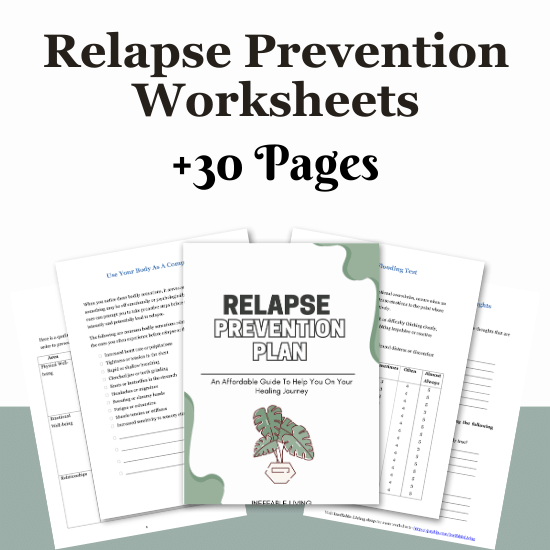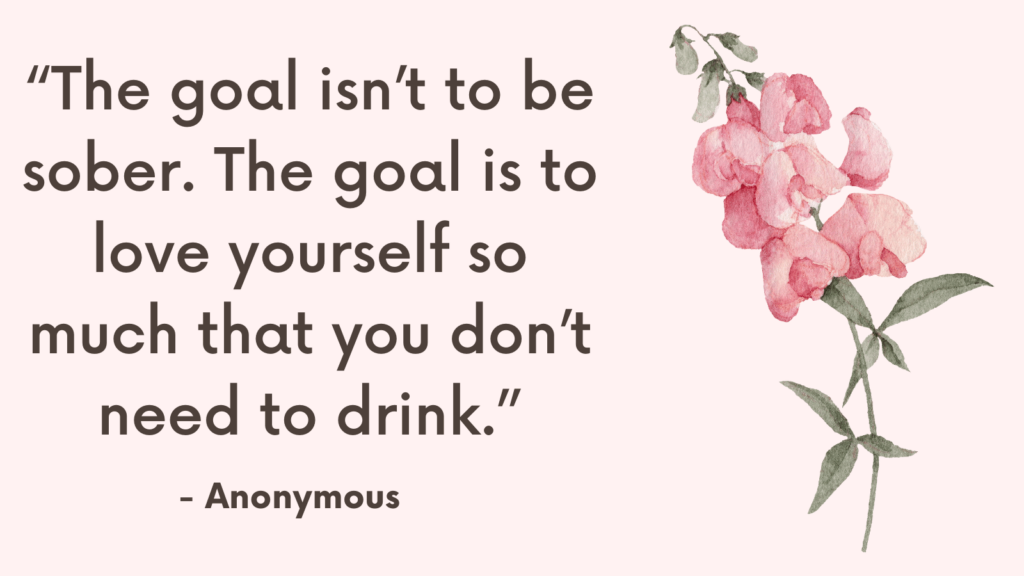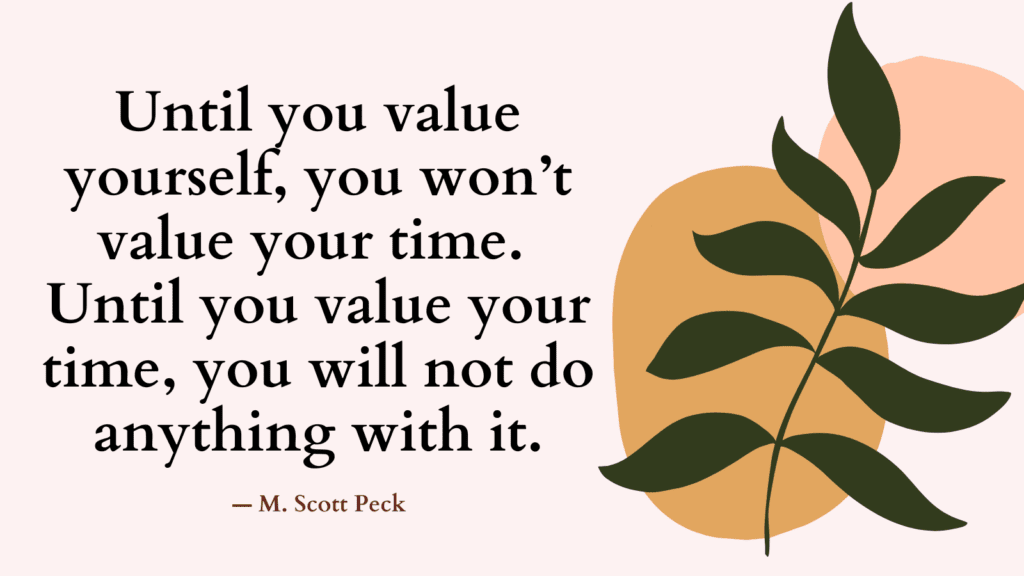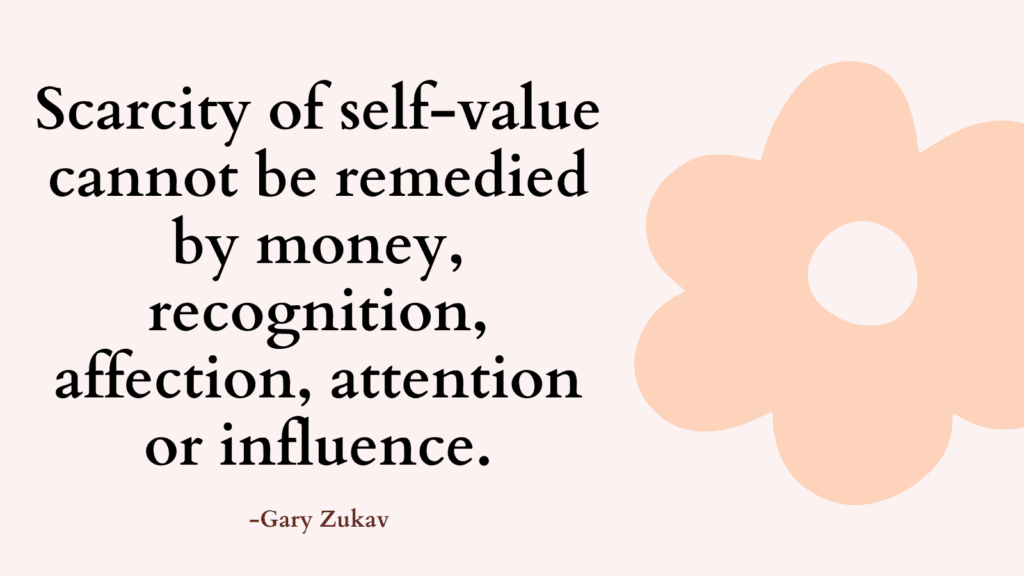This post contains some of the best sobriety affirmations.
Sobriety Affirmations
Here are 50 sobriety affirmations that you can use to empower yourself and stay focused on your journey to recovery:
1. My sobriety is important to me, and I am committed to maintaining it.
2. I am capable of overcoming any challenges that come my way.
3. I am stronger than any temptation or craving.
4. I am worthy of a healthy, sober life.
5. I deserve to live free from the grip of addiction.
6. Every day, I am moving closer to my best self.
7. I choose sobriety because I value my well-being.
8. My past does not define me; I am creating a new, bright future.
9. I release all negative thoughts and embrace positivity.
10. I am grateful for the support and love I receive on my journey to recovery.
11. I am in control of my actions and choices.
Related: What Is Emotional Sobriety and How to Achieve It? (+FREE Worksheets)
12. I trust in my ability to handle difficult emotions without turning to substances.
13. Each day sober is a victory worth celebrating.
14. I am worthy of love and respect, both from myself and others.
15. Sobriety allows me to fully experience and appreciate life.
16. My determination to stay sober grows stronger each day.
17. I am making positive changes that benefit my physical and mental health.
18. I am proud of the progress I have made so far.
19. I let go of guilt and shame, and embrace self-forgiveness.
20. My sobriety inspires others and spreads hope.
21. I am surrounded by people who support my decision to live sober.
22. I am focused on creating a fulfilling and joyful life without substances.
23. My mind is clear, and my spirit is free.
24. I am learning to cope with stress and challenges in healthy ways.
25. I am dedicated to my personal growth and healing.
26. I am open to seeking help and guidance when I need it.
27. I am worthy of peace and serenity in my life.
28. I am building a strong foundation for my future through sobriety.
29. I am capable of building meaningful connections without relying on substances.
30. I am taking care of my body, mind, and soul by choosing sobriety.
Related: How to Enjoy Being Sober? (+FREE Worksheets)
31. I am resilient and capable of bouncing back from setbacks.
32. I am becoming the best version of myself through sobriety.
33. I am gentle with myself as I navigate the ups and downs of recovery.
34. I am empowered to make positive choices for my well-being.
35. I am breaking free from the chains of addiction and reclaiming my life.
36. I am filled with hope and optimism for the future.
37. I am worthy of a life filled with joy and fulfillment.
38. I am learning to find happiness in simple, everyday moments.
39. I am creating a life that aligns with my values and aspirations.
40. I am letting go of old habits that no longer serve me.
41. I am embracing the journey of self-discovery and transformation.
42. I am choosing sobriety as an act of self-love and self-respect.
43. I am open to new experiences and opportunities that come with sobriety.
44. I am building a support network that lifts me up on my journey.
45. I am grateful for the chance to rewrite my story through sobriety.
46. I am finding peace and contentment within myself.
47. I am loved and valued just as I am, without needing substances to feel whole.
48. I am determined to live a purposeful and meaningful life.
49. I am confident in my ability to stay true to my sobriety goals.
50. I am proud to be living a sober, authentic life.
Related: How Long Does Sobriety Fatigue Last?
How to Effectively Use Sobriety Affirmations?
Utilizing sobriety affirmations can be a powerful tool in promoting positive thinking and reinforcing one’s commitment to maintaining a sober lifestyle.
1. Understanding the Power of Affirmations:
Affirmations are positive statements that are used to challenge and overcome self-sabotaging and negative thoughts.
When used consistently, affirmations can help rewire the brain, shifting one’s mindset toward a more positive and empowering perspective.
This process, known as cognitive restructuring, can be particularly beneficial for individuals in recovery, as it assists in combating self-doubt, cravings, and negative thought patterns associated with addiction.
2. Identifying and Crafting Personalized Affirmations:
The first step in effectively using sobriety affirmations is to identify the specific areas of focus that are relevant to your recovery journey.
These can include managing cravings, building self-confidence, fostering resilience, or cultivating a sense of purpose.
Once you have identified these areas, you can craft personalized affirmations that resonate with your individual needs and goals.
For example, if managing cravings is a priority for you, an affirmation such as “I am stronger than any craving, and I have the power to overcome it” can be impactful.
Related: How to Break the Addiction Cycle? [Definitive Guide]
3. Repetition and Consistency:
Consistent repetition is key to the effectiveness of affirmations.
Engaging in a daily practice of reciting, writing, or internalizing your chosen affirmations can help reinforce their positive influence on your thought patterns and beliefs.
Consider incorporating your affirmations into your morning or bedtime routine, as well as integrating them into your daily meditation or mindfulness practices.
By doing so, you allow the affirmations to permeate your subconscious mind, leading to a gradual shift in your overall mindset.
4. Embracing Present-Tense and Positive Language:
When crafting affirmations, it is important to frame them in the present tense and with positive language.
This approach helps to instill a sense of immediate empowerment and reinforces the belief that the desired positive change is already taking place.
For instance, instead of saying “I will overcome my addiction,” you would say, “I am committed to my sobriety and living a healthy, fulfilling life.” This subtle shift in language encourages a proactive and confident mindset.
Related: 4 Stages of Addiction (+FREE Worksheets)
5. Visual and Auditory Reinforcement:
In addition to verbalizing affirmations, you can enhance their impact by visualizing and listening to them.
Creating visual cues, such as writing your affirmations on sticky notes and placing them in prominent locations, serves as a continual reminder of your commitment to sobriety.
You may also consider recording your affirmations and listening to them during moments of reflection or relaxation, allowing the positive messages to resonate deeply within your subconscious.
6. Adapting Affirmations to Challenging Situations:
Recovery is a journey that presents various challenges, and it is essential to adapt your affirmations to address specific difficulties you may encounter.
During times of heightened stress or triggers, having tailored affirmations at hand can provide much-needed support.
For example, if you are facing a particularly challenging situation, affirmations such as “I am capable of navigating through difficult times without turning to substances” can serve as a source of strength and motivation.
Related: How to Avoid Addiction? Top 9 Things You Can Do
7. Seeking Support and Accountability:
Using sobriety affirmations can be complemented by seeking support from peers, mentors, or professional counselors.
Sharing your affirmations with a supportive individual or group creates a sense of accountability and encouragement.
Additionally, discussing your affirmations with a counselor can offer valuable insights and guidance on how to align them with your specific recovery goals.
8. Monitoring Progress and Reflecting on Growth:
As you continue to integrate affirmations into your daily routine, take time to reflect on the changes in your thought patterns, emotions, and behaviors.
Keep a journal to track your progress, noting any shifts in your mindset and how your affirmations have influenced your overall well-being.
Recognizing and celebrating small victories along the way can further reinforce the effectiveness of your affirmations.
9. Incorporating Mindfulness and Self-Compassion:
Practicing mindfulness can deepen the impact of sobriety affirmations by fostering a greater awareness of the present moment and promoting self-compassion.
As you engage with your affirmations, cultivate a sense of mindfulness by grounding yourself in the here and now, acknowledging your emotions without judgment, and embracing self-compassion throughout your recovery journey.
Related: What Is a Functioning Addict? (+FREE Worksheets)

Tips to Maintain Sobriety
Here are some science-based tips to help you maintain your sobriety and support your overall well-being:
1. Build a Strong Support Network:
Surround yourself with individuals who are supportive of your sobriety.
This can include friends, family members, support groups, or a sponsor if you are part of a 12-step program.
Having a reliable support network can provide encouragement, guidance, and understanding during challenging times.
2. Develop Healthy Coping Mechanisms:
Identify and cultivate healthy coping mechanisms to manage stress, anxiety, and other emotional challenges.
This may include mindfulness practices, physical exercise, creative outlets, or engaging in activities that bring you joy and relaxation.
3. Create a Structured Routine:
Establishing a daily routine can provide stability and a sense of purpose.
Having a structured schedule can help minimize idle time, which may otherwise lead to boredom or triggers for substance use.
Related: How to Help an Addict without Enabling?
4. Prioritize Self-Care:
Pay attention to your physical and emotional well-being.
Engage in activities that promote self-care, such as getting regular exercise, maintaining a balanced diet, prioritizing sleep, and practicing relaxation techniques like meditation or deep breathing exercises.
5. Set Realistic Goals:
Establish achievable short-term and long-term goals that align with your recovery journey.
Celebrate your progress and accomplishments, no matter how small, as they contribute to your overall success.
6. Avoid High-Risk Environments:
Be mindful of environments or situations that may jeopardize your sobriety.
If possible, limit exposure to places, people, or events that could trigger cravings or temptations to use substances.
7. Educate Yourself About Addiction:
Increase your understanding of addiction by learning about its effects on the brain, behavior, and overall health.
This knowledge can empower you to make informed decisions and develop resilience in managing challenges related to sobriety.
Related: Top 10 Signs of an Addict Relapsing
8. Practice Mindfulness and Stress-Reduction Techniques:
Incorporate mindfulness practices into your daily routine to cultivate awareness of your thoughts, emotions, and triggers.
Mindfulness can help you stay grounded in the present moment and manage stress more effectively.
9. Stay Connected to Positive Activities and Hobbies:
Engage in activities and hobbies that bring fulfillment and joy.
Investing your time in positive pursuits can enhance your overall well-being and provide alternative sources of satisfaction.
Conclusion
The effective use of sobriety affirmations involves personalization, consistency, and a commitment to fostering a positive and resilient mindset.
By integrating affirmations into your daily routine, adapting them to challenging situations, and seeking support when needed, you can harness the transformative power of positive thinking in your journey toward sustained sobriety and holistic well-being.
Remember that maintaining sobriety is a journey that may have its ups and downs. It’s essential to be patient and compassionate with yourself as you navigate through challenges.



